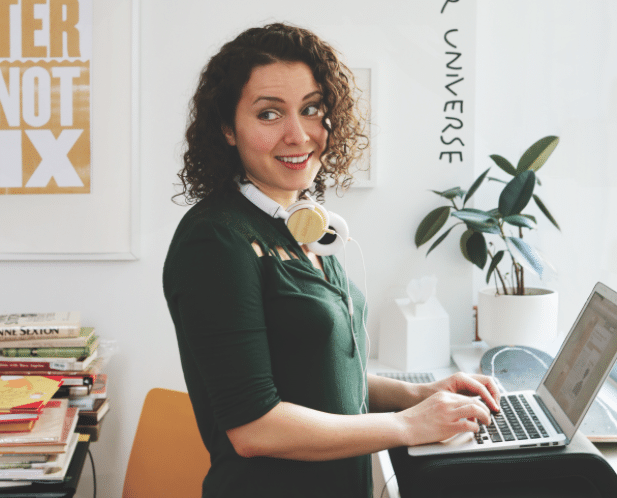The first time I learned about productivity and purpose, I heard it from my mother.
“Ah-mei, where are you? What are you doing?”
Mom was scurrying around the house, looking for her lost keys. Already running late for her day, she was hoping I could step up to help. But I didn’t hear her plea, perhaps because I had consciously blocked her out.
I was six years old, completely mesmerized with something far more important to me – American TV.
Popeye was getting beat up by “Bluto” the bully – here’s the moment of magic that I had been waiting for…
“Come on, come on! Eat your spinach now! Hurry… Hurry up!!” I remember screaming out loud, inadvertently revealing my hideout – the living room.
Mom came rushing in, yelling at me – “Ah-mei, what are you doing? What’s wrong with you? I was screaming for your help and you’re screaming in front of the TV.”
I was so busted. Mom was mad.
“You are totally useless! Why did I even give birth to you?!” (This last sentence sounds awful in English. But spoken in Cantonese dialect, it didn’t sound so bad.)
She made a point about the purpose of my existence, which I took seriously.
Here’s the point – Be useful. Be helpful. Be productive.
It would be a message that stayed with me during my childhood, reinforced during adolescence, and rewarded in adulthood.
It was a mantra that I used often to win praises and promotions, especially in the fiercely competitive environment like New York, where I spent most of my life working in media and journalism. My near-obsession with being productive served me extremely well. I wore my “worker bee” label as a badge of honor, and I marveled at my reputation as someone who always got the job done.
For a long time, I didn’t find anything particularly problematic with pre-occupation with productivity until recently, when I heard an insightful interview with a digital sage of sort – Maria Popova.
Maria Popova is the creator/curator of a fabulous website (BrainPickings) filled with old-fashioned wisdom gleaned from thinkers, philosophers and poets of the bygone era.
Ms. Popova told Krista Tippett, host of NPR’s “On Being,” one of my favorite podcasts that she did not like to be described as someone with a “prodigious workload.”

Maria Popova (Photo by Anna Wolf for Dumbo Feather)
Here’s an excerpt that interview relating to her views on productivity and purpose.
Ms. Tippett: (20:33) You’ve become a role model for a lot of young people looking to navigate life and life with technology, both entrepreneurially and meaningfully. And it’s interesting because one of the things that you’re very known for — whenever people write about you, they go into great detail about your prodigious workload.
(21:11) “450 hours of work each month, hundreds of pieces read a day, 12 to 15 books a week, three to eight hours writing a day, publishes three hours, tweets four times per hour between 8:00 a.m. and 11:00 p.m.) Is it all true?
Ms. Popova: Some of it has been true at different times.
MS. POPOVA: (22:09) But// Even if it’s factually true, I think the framing is a little bit misleading because it’s framed as a sort of as a productivity thing. I mean, look at how much, like, some random person in the world gets done, you know? For me, it feels very purposeful.
Popova went on to define the purpose of productivity not just by sheer quantity, like the number of hours we put in a day or the number of projects we busy ourselves with, but also by the quality of unoccupied time. Popova has discovered that the best ideas and insights on the “truth of her experience, of the human experience” often come to her when she is on the bike, at the gym or in the shower! So true. That’s happened to me too although I haven’t figured out why. But Maria has.
Ms. Popova: “I’ve really come to realize //that these are simply the most unburdened spaces in my life, the moments in which I have the greatest uninterrupted intimacy with my own mind, with my own experience. “
The idea that stillness or solitude can be purposeful is not new. Most of us know that breakthrough in our thinking or our being often comes through those gaps in between our stuffed schedules. But we are not always mindful of creating space for these innovative breakthroughs to take place naturally. We tend to fill every blank in our everyday schedule. We are hard-wired since childhood to prove our usefulness through our output. Our productivity and our worth are intertwined. We strive to achieve success by quantitative metrics set by society, workplace, friends and family.
Our minds are constantly crowded with these questions – “How high have you scored?” “ How much have you done?” “How much do you make?” How many hours do you work?”
Popova is right on. If we want to discover and rediscover the purpose our work, we need to invite “unburdened spaces” to come in so to animate contemplation over the meaning of our work, and the purpose of our lives.


